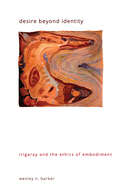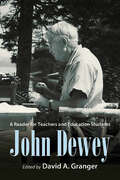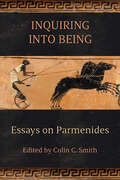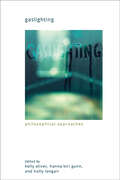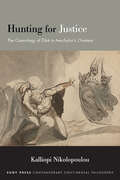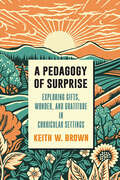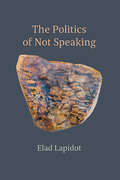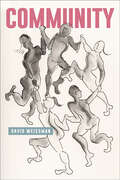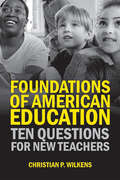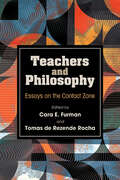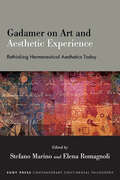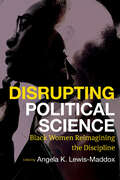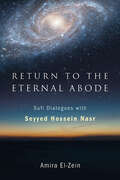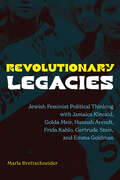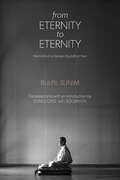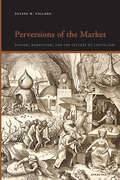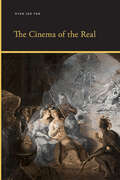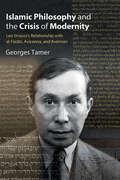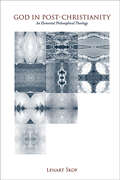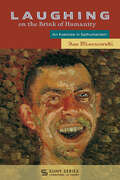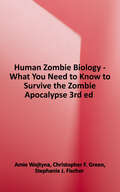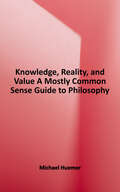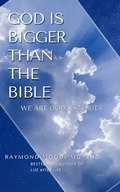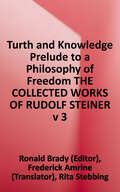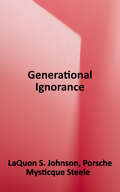- Table View
- List View
Desire beyond Identity: Irigaray and the Ethics of Embodiment (SUNY series in Gender Theory)
by Wesley N. BarkerCritically adapts the notion of desire in Luce Irigaray's philosophy to rethink the role of embodiment in sociopolitical and philosophical discourses today.Arguing for a radical return to desire in Luce Irigaray's thought, this book decisively intervenes in impasses around questions of identity that continue to confound contemporary discourse and politics. By prioritizing the disruptive potential of desire rather than sexual difference, Wesley N. Barker extends Irigaray's relational theory of becoming into new territory, opening generative, often surprising pathways for conversation with philosophies of race, queer theory, political theology, decolonial theory, and posthuman thought. As a source for reimagining materiality, desire is pulled free of a phallocentric, white, colonial framework and mobilized toward a philosophy of living capable of addressing the twenty-first century's multifaceted crises of identity, representation, and embodiment.
John Dewey: A Reader for Teachers and Education Students
by David A. GrangerDesigned specifically for teachers and education students, with carefully selected articles, lectures, and book chapters covering Dewey's major ideas.This John Dewey reader was designed specifically for teachers, teacher educators, and education students. Using carefully selected articles, lectures, book chapters, and other brief writings from Dewey's collected works, it covers major concepts and ideas from his extensive research and reflections on education and teaching. The twenty-five readings were carefully chosen for their accessibility and their continuing relevance to the work of classroom teachers and other school-based practitioners. To enhance its usefulness, the book contains a glossary of Deweyan terms, summaries for each reading, a selective annotated bibliography, and an index. Instead of merely encountering Dewey's views secondhand, this volume empowers readers to access and explore primary sources in a user-friendly way.
Inquiring into Being: Essays on Parmenides (SUNY series in Ancient Greek Philosophy)
by Colin C. SmithNew essays on early Greek natural philosopher Parmenides, who is perhaps the originator of metaphysics.Inquiring into Being is a study of Parmenides, the early Greek pre-Socratic philosopher often credited as the first metaphysician and whose sole written work was a philosophical poem. In his poem, Parmenides has a narrating goddess character indicate the sense of being that must be and cannot be as a corrective to the errors mortals make when accounting for the ultimate nature of reality while showing a keen scientific understanding of natural phenomena. Inquiring into Being brings together and further develops recent work on Parmenides and the surviving fragments of his text through twelve chapters by scholars from the United States and United Kingdom working in analytic and continental philosophy, classics, political theory, literary theory, and the history of science. It serves as a guide through many of the interpretive controversies in Parmenides's poem while offering new insights into Parmenides's role as poet, scientist, natural philosopher, and investigator into the nature of being.
Gaslighting: Philosophical Approaches (SUNY series in Gender Theory)
by Kelly Oliver Hanna Kiri Gunn Holly LongairA feminist introduction to emerging philosophical understandings of gaslighting.Originating in a 1938 play, the term gaslighting has become part of our everyday vocabulary. But do we truly know what it means? This collection of new and foundational essays explores concepts and experiences of gaslighting from philosophical perspectives. Contributors build on longstanding feminist analyses of the relations among knowledge, affect, and power to consider how gaslighting can work at not only individual but also structural levels to undermine its targets. In examining racial, epistemological, medical, affective, political, and other forms of gaslighting, the book helps illuminate contemporary power relations and provides urgently needed tools for further research in and beyond the field of philosophy.
Hunting for Justice: The Cosmology of Dike in Aeschylus’s Oresteia (SUNY series in Contemporary Continental Philosophy)
by Kalliopi NikolopoulouUtilizes Greek tragedy to investigate the fundamentally arbitrary and violent nature of justice.A purely political understanding of justice does not convey the cosmological origins of the ancient conception of justice, Dikē, in Aeschylus's Oresteia. Drawing from Walter Burkert's anthropology of the hunt in Homo Necans, which articulates an ancient cosmology and implies a theory of (tragic) seriousness that parallels Aristotle's naturalist interpretation of tragedy, Hunting for Justice argues that justice is rooted in predation as exemplified by the Furies. Although the Oresteia has been read as the passage from the violence of nature to civic justice, Kalliopi Nikolopoulou offers an original interpretation of the trilogy: the ending of the feud is less an instance of political deliberation (as Hegel maintained), and more an instance of nature's necessary halting of its own destructiven'ess for life to resume. Extending to contemporary contexts, she argues that nature's arbitrariness continues to underpin our notions of justice, albeit in a distorted form. In this sense, Hunting for Justice offers a critique of the political infinitization and idealization of justice that permeates our current discourses of activism and social justice.
A Pedagogy of Surprise: Exploring Gifts, Wonder, and Gratitude in Curricular Settings
by Keith W. BrownCombines theory and practice to inspire teachers to embrace a sense of surprise in their classrooms.What would your classroom be like if you could see it as something surprising, novel, and fresh in every moment? What are the unique gifts that students and teachers alike bring to classrooms? Through a combination of robust theory, in-depth scholarship, and practical exercises for teachers, A Pedagogy of Surprise is a vital resource that allows teachers to explore how they can bring a sense of wonder, surprise, and gratitude into their experiences of the classroom. It will delight and inspire anyone with an interest in using contemplation, mindfulness, and reflection to enhance teacher wellness. Topics include how a phenomenology of surprise can inform and enhance the teaching and curricular experience, the gift economy as applied to the classroom, the meaning and scope of gratitude practices in curricular settings, and applications of surprise, gifts, and gratitude to teaching. The final chapter includes inspiring visualizations that teachers of any grade can apply to feel more gifted, surprised, and connected within their classroom milieu.
The Politics of Not Speaking
by Elad LapidotIn contrast to the common understanding of politics as a domain of speaking, reveals an alternative tradition where the spoken word fails, collapses, breaks (i.e., a politics of not speaking).According to a common conception, modern politics is based on speaking, on discussion and rational argumentation-on "logos." In contrast, The Politics of Not Speaking argues that politics is based not on speaking but on the suspension of conversation, on the break of rational discourse, on "logoclasm"-on politics of not speaking. Elad Lapidot presents the notion of politics as logoclasm through readings of five canonic thinkers of the twentieth century: Carl Schmitt, Martin Heidegger, Frantz Fanon, Gayatri Spivak, and Jacques Derrida. Tracing the development of the politics of not speaking from the 1930s to the 1990s, he shows how the notion of logoclasm, the rupture of rational discussion, explains key notions in modern politics, such as sovereignty, law, the state, violence, war, race, colonialism, decolonization, and boycott, and sheds light on current debates concerning the Boycott, Divestment, Sanctions (BDS) movement and the Gaza war.
Community
by David WeissmanCommunities are vital to personal and social well-being because collaboration is required where skills and resources are scarce; their pathologies—anonymity and isolation, tribalism and murder—defeat us.Community is often invoked respectfully but without a clear referent. The word is said to be used ninety-four ways, evidence that its sense is diffuse. Community clarifies the word's principal expressions and the alternative ideological spaces-holistic and hierarchical or open and tolerant-in which communities form. Members bind in the interest of utility-jobs or schools-or because home and friendship are the focus of feeling and significance. These binders are social glue: they explain our dedication to communal aims and loyalty to fellow members. Autonomy in their context is socialized; its bases are the information, attitudes, and skills acquired when families and schools prepare us for roles in communities inherited or chosen. Yet community is fraught. Holistic societies are repressive; open societies are vulnerable. The members of successful communities-families, businesses, and schools-often thrive. Those excluded for want of luck or skill are abandoned and anonymous. Their isolation is one of an open society's two pathologies: collaboration is a social necessity when resources, space, and skills are scarce; competition turned visceral and murderous is a vice.
Foundations of American Education: Ten Questions for New Teachers
by Christian P. WilkensAnswers all the questions that students preparing for a career in education ask.Foundations of American Education asks many of the questions new teachers face: How should I handle classroom management? How will I know if students are learning what they should? What should I do in class my first year? How can I make things better for students? This book addresses major topics covered by introductory-level education classes, such as the history of US public schools, curriculum and assessment, classroom management, school governance, law, and more. Each chapter includes stories and examples from real teachers and schools and closes with a major US court case about public education. A major goal for the volume is to develop a sense for what US public school teachers do now and how we might be able to do better in the years ahead.
Teachers and Philosophy: Essays on the Contact Zone (SUNY series, Horizons in the Philosophy of Education)
by Cara E. Furman; Tomas de Rezende RochaPhilosophers and educators come together to address contemporary issues in education.Teachers and Philosophy showcases the potential of education practitioners and philosophers of education working and writing together. Following Mary Louise Pratt, this meeting space is referred to as a "contact zone," and contributors demonstrate the power and benefit of writing from this liminal space. Introductory and concluding chapters provide an argument for the value of bringing together philosophers and practitioners as well as tips for facilitating these interactions. Situated amid the COVID-19 pandemic, the volume grapples with the challenges that practitioners face around teaching controversial topics, crafting inclusive curricula, indigeneity, dis/ability, urban schooling, nature-based education, rural education, mental health, coping with feelings of anger, and more. Each chapter ends with suggestions for further reading or engagement, questions for reflection and discussion, and an activity that a class or reading group can move through together.
Gadamer on Art and Aesthetic Experience: Rethinking Hermeneutical Aesthetics Today (SUNY series in Contemporary Continental Philosophy)
by Stefano Marino; Elena RomagnoliHans-Georg Gadamer was one of the greatest intellectual figures of the twentieth century. As a philosopher trained in phenomenology, he established philosophical hermeneutics as one of the leading traditions of contemporary philosophy and opened new paths for philosophical reflection. Within the many dimensions of Gadamer's vast, complex, and multifaceted thinking, a special role is played by the question concerning the relevance of the various arts and the centrality of aesthetic experience in human life. Despite being one of the most relevant voices of twentieth-century philosophy, Gadamer's hermeneutics has at times been overlooked in contemporary philosophical debates. The firm conviction at the basis of this volume is that Gadamer's thought is still relevant today, especially regarding aesthetic questions concerning the persistent meaning and truth of art in the age of what he called "the shadow of nihilism" and in the age of the so-called "end of art." In contrast to the claim that Gadamer's philosophy is "anti-modern," or allegedly "out of date" in comparison to other philosophical approaches to aesthetic questions, Gadamer on Art and Aesthetic Experience aims to show that a renewed and critical confrontation with Gadamer's aesthetic thinking can offer stimulating and penetrating insights to understand the role of art in contemporary society in all its transformations and its challenging manifestations.
Disrupting Political Science: Black Women Reimagining the Discipline (SUNY series in Black Women's Wellness)
by Angela K. Lewis-MaddoxNineteen Black women in political science share their personal and professional journeys, shedding light on the state of the discipline—and how it needs to change.This volume brings to the fore Black women's experiences of, and contributions to, political science-a field that never intended to view them as subjects worthy of study and certainly not as professors. Disrupting Political Science demonstrates how Black women blend creative resistance and self-care to overcome obstacles and navigate the discipline's hegemonic demands. Representing a range of career stages and types of institutions, the nineteen contributors share stories of trauma and triumph, as well as concrete guidance rooted in Black feminist literature and reports on the profession. A witty, searing, sometimes heart-wrenching catalyst to reimagine political science, Disrupting Political Science is essential reading for everyone in the discipline and for faculty and administrators across the university committed to recruiting and retaining Black women.
Return to the Eternal Abode: Sufi Dialogues with Seyyed Hossein Nasr (SUNY series in Islam)
by Seyyed Hossein Nasr Amira El-ZeinReturn to the Eternal Abode is a series of in-depth discussions between Amira El-Zein and Seyyed Hossein Nasr, one of the world's foremost scholars of Islamic, religious, and comparative studies. Each of the six chapters addresses a central theme at the heart of Sufism: creativity, cosmology, the environment, poetry, art, and modernity. Nasr's answers to El-Zein's probing questions offer thought-provoking, comprehensive, and interdisciplinary approaches to these aspects of the Sufi tradition, reflecting a lifetime of scholarship and comfortably synthesizing various sources, philosophies, and traditions, both Islamic and otherwise. The book also sheds light on Nasr's relations to eminent thinkers of the twentieth century, such as Titus Burckhardt, Mircea Eliade, Louis Massignon, and Henry Corbin and provides, in many ways, an accessible synopsis or overview of his entire oeuvre.
Revolutionary Legacies: Jewish Feminist Political Thinking with Jamaica Kincaid, Golda Meir, Hannah Arendt, Frida Kahlo, Gertrude Stein, and Emma Goldman (SUNY series in Feminist Criticism and Theory)
by Marla BrettschneiderThis book provides a timely new transnational lineage of Jewish feminist revolutionary legacies. Using extensive research, deep thinking, and a bold methodology, Marla Brettschneider tousles with a host of anti-colonial, feminist, anti-racist, and queer troublemakers—Jamaica Kincaid, Golda Meir, Hannah Arendt, Frida Kahlo, Gertrude Stein, and Emma Goldman. Brettschneider brings together these feisty women's lives, work, politics, thinking, and art to wrestle with big questions: How can we make our lives, individually and collectively, in our diversity as Jews and in grounded solidarity with others? How do these women bring out otherwise unidentified, unnamed, and underexamined issues in Jewish studies, feminism, politics, and a range of critical theories? Revolutionary Legacies invites Jews, feminists, anti-racists, and all manner of justice seekers to think, and create common cause, with these rabblerousers.
From Eternity to Eternity: Memoirs of a Korean Buddhist Nun
by Bulpil SunimFrom Eternity to Eternity is the story of Bulpil Sunim, arguably the most respected female Seon (Zen) master in Korea. Written with candor and an unpretentious sense of humor, her memoir provides both a fascinating record of her life and a deeply accessible window into Buddhist thought and spirituality. Describing and reflecting on her own experience of meditation and her journey as a woman in a male-dominated religious practice, she reveals the largely unknown realities of female monastic life in Korea. She also provides an unprecedented glimpse into her relationship with her father, the legendary Seon Master Seongcheol Sunim, who was widely considered a living Buddha in Korea. This lyrical autobiography, the first of its kind in Korean Buddhist literature, offers readers a chance to learn about Korean Seon meditation and practice from a woman’s perspective and will be of interest not only to scholars of Buddhism but to general readers curious about Buddhism, the experiences of religious women, or simply the remarkable life of a great spiritual leader.
Perversions of the Market: Sadism, Masochism, and the Culture of Capitalism (SUNY series, Insinuations: Philosophy, Psychoanalysis, Literature)
by Eugene W. HollandPerversions of the Market argues that capitalism fosters sadism and masochism—not as individual psychological proclivities but as widespread institutionalized patterns of behavior. The book is divided into two parts: one historical and the other theoretical. In the first, Eugene W. Holland shows how, as capital becomes global in scale and drives production and consumption farther and farther apart, it perverts otherwise free markets, transforming sadism and masochism into borderline conditions and various supremacisms. The second part then turns to Deleuze and Guattari's "schizoanalysis," explaining how it helpfully embeds Freud's analysis of the family and Lacan's analysis of language within an analysis of the capitalist market and its psycho-dynamics. Drawing on literature and film throughout to illuminate the discontents of modern culture, Holland maintains that the sadistic relations of production and masochistic relations of consumption must be eliminated to prevent capitalism from destroying life as we know it.
The Cinema of the Real (SUNY series, Insinuations: Philosophy, Psychoanalysis, Literature)
by Hyon Joo YooA significant intervention into Lacanian film studies, this book sets forth a new theory of the psychoanalytic Real in cinema. In psychoanalysis, the Real ruptures the Symbolic that organizes law, ideology, and other systems of belief, revealing fissures in this underlying order. The Cinema of the Real explores how transnational cinema and especially South Korean cinema facilitate an encounter with the Real, enabling the emergence of a new political subject. Paying close attention to form, Hyon Joo Yoo reveals the existence of an "emancipatory drive" in films by Jang Hun, Park Chan-wook, Lee Chang-dong, Jia Zhangke, Michael Haneke, Claire Denis, and Bong Joon-ho, among others. Their work in effect provides viewers with a picture of how it looks and feels to be on a trajectory in which the subject and her world can change. Far from being a passive consumer of images, Yoo's spectator enters the space of the Real. Theoretically rigorous and inventive, The Cinema of the Real offers new, transnationally attuned tools for conceptualizing the body, affect, femininity, and spectatorship, as well as fresh readings of both classic and contemporary films.
Islamic Philosophy and the Crisis of Modernity: Leo Strauss's Relationship with al-Fārābī, Avicenna, and Averroes (SUNY series in the Thought and Legacy of Leo Strauss)
by Georges TamerThis study examines the impact of the medieval Muslim philosophers al-Fārābī, Ibn Sīnā (Avicenna) and Ibn Rushd (Averroes) on Leo Strauss. Through meticulous source analysis, Georges Tamer critically evaluates Strauss's interpretation of their works. Furthermore, he explores how Islamic philosophy shaped Strauss's understanding of Maimonides and Plato, providing a compelling solution to the modernity crisis he identified. Offering fresh perspectives on the evolution of Strauss's thought and his distinctive approach to Arabic sources, Tamer sheds light on the pivotal role of al-Fārābī, the most significant Muslim philosopher in Strauss's view, including key aspects of al-Fārābī's political philosophy and his nuanced take on Plato's ideas. Islamic Philosophy and the Crisis of Modernity is a valuable addition to current scholarship on Strauss. Both philosophically erudite and philologically rigorous, Tamer presents the reader with a balanced perspective on Strauss's insights without being overly reverential or dismissive.
God in Post-Christianity: An Elemental Philosophical Theology (SUNY series in Theology and Continental Thought)
by Lenart ŠkofGod in Post-Christianity combines Eastern and Western influences into a dazzling survey of the contemporary theological landscape. Reading "the age of the Spirit" as "the age of the Breath," the book argues for a material, elemental, and sensory theology of God following the death of the ontotheological God of metaphysics. Drawing inspiration equally from Irigaray and Feuerbach, it offers a vision of God that is both feminist and humanist, a divine becoming for humanity, a sacred alliance with Nature. By presenting and analyzing the modern philosophies of Hegel, Schelling, and Merleau-Ponty, as well as such contemporary figures as John Caputo and Catherine Keller, and by drawing on unexpected, forgotten, or neglected sources such as Vedic poetry and American Mormonism and figures such as Averroes and Amalric of Bène, the book makes an original argument about God that resonates with currents in new materialism, comparative theology, and affect theory. Both speculative and mythopoetic, it is intended to forge a way forward for humanity to achieve the intersubjective and interreligious peace we all crave and deserve.
Laughing on the Brink of Humanity: An Exercise in Epihumanism (SUNY series, Literature . . . in Theory)
by Jan MiernowskiWhat does it mean to be human? And, more precisely, what does it mean to be human now, with both humanism and the humanities in crisis? In answer to these questions, Laughing on the Brink of Humanity seeks not some essence of the human but rather an epiphenomenal manifestation—a sign of the human. The book finds such a sign in the joyless, painful, and often deadly laughter that resonates when we cross the barrier between what is human and what is not: animality, machinery, divinity. Jan Miernowski brings together a wide swath of discourses and figures, from Plato and the Bible through early modern humanism, to Friedrich Nietzsche, Georges Bataille, Hannah Arendt, Claude Lanzmann, Spike Jonze, Tom Stoppard, and Michel Houellebecq. Looking for laughter on the brink of humanity—in literature and philosophy, natural science and film, theology and computer science—the book offers an exercise in epihumanism appropriate to our posthuman age.
Human Zombie Biology: What You Need to Know to Survive the Zombie Apocalypse, Third Edition
by Amie Wojtyna Christopher F. Green Stephanie J. FischerZombies aren’t real. To our knowledge, there are no secret government laboratories working on creating or defeating the zombie menace, but if such laboratories are ever created, then sign us up to be the earth’s last, best hope. Human Zombie Biology provides students the knowledge to gain a greater understanding of the concepts of biology as they apply to zombies. The Centers for Disease Control and Prevention (CDC) has even used zombies to educate the American Public on how to be prepared for any emergency, using the philosophy that if you are prepared for the zombies, you are certainly prepared for whatever Mother Nature may throw at you. It is in this spirit that we offer you this book; what better way to learn the concepts of Biology than by using our friend the zombie? Think you don’t use biology? Think again. Every time you take a deep sniff of air to determine if there is a decaying zombie nearby-- or, slightly more likely, to determine if the old take-out food in the back of your fridge is safe to eat it―then you are using biology. Since people have started talking and then writing about zombies these stories have been a reflection of society, and have drawn upon scientific knowledge to make the stores as realistic as possible. So realistic are these stories that they make for excellent educational tools as they both grab your attention and can impart knowledge. Included with your eBook purchase, you will also receive access to KHQ, Kendall Hunt’s exclusive custom study app. Designed for today’s fast-paced environment, KHQ features chapter quizzes and flashcards that empower students to learn on the go!
Knowledge, Reality, and Value: A Mostly Common Sense Guide to Philosophy
by Michael HuemerThe world's best introduction to philosophy, Knowledge, Reality, and Value explains basic philosophical problems in epistemology, metaphysics, and ethics, such as: How can we know about the world outside our minds? Is there a God? Do we have free will? Are there objective values? What distinguishes morally right from morally wrong actions? The text succinctly explains the most important theories and arguments about these things, and it does so a lot less boringly than most books written by professors.
God is Bigger Than the Bible: We Are God's Stories
by Raymond MoodyDr. Raymond Moody looks at God and how his personal understanding of the Creator has changed over the course of his life and research into near-death experiences. Dr. Moody organizes his insights about God into 13 simple and profound ideas and walks us through them using stories and examples from his own life and from accounts of encounters with God in the hereafter. He looks at our society's beliefs about God, how religion can both help and hinder our relationships with the Divine, and how we can bring Source into our lives with a new understanding that transcends all limits.
Truth and Knowledge: Prelude to a Philosophy of Freedom
by Rudolf SteinerThis third volume of Rudolf Steiner's Collected Works was originally his doctoral dissertation. Terse and to the point, it truly is a prelude to his later Philosophy of Freedom - indeed, one can sense an excitement of discovery that is absent in the latter work. This translation has been thoroughly reworked to make it conform to the late Ronald Brady's masterful introduction, which provides a line-by-line commentary.
Generational Ignorance
by LaQuon S. JohnsonThis book focuses on the relationship(s) between ideologies incorporated from inherited trains of thought and those that have been granted the option or encouraged to utilize them to propel "progression". The book begs the question, "Why is Ignorance, Obnoxious Behavior, Or A Pathway to Prison vaguely considered when a child's inheritance is brought to the table?" Generational Ignorance presents a parable composed to denounce the myth that prized possessions predominantly comes in forms of assets, real estate, and positive productivity.
